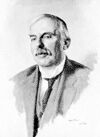Rutherford, Ernest, barón
- Rutherford, Ernest, barón
(30 ago. 1871, Spring Grove, Nueva Zelanda–19 oct. 1937, Cambridge, Cambridgeshire, Inglaterra).
Físico británico nacido en Nueva Zelanda. Después de estudiar en el Canterbury College, viajó a Gran Bretaña a estudiar en la Universidad de Cambridge, en donde trabajó con J.J. Thomson en el Laboratorio Cavendish. Más tarde enseñaría en la Universidad McGill en Montreal (1898–1907) y en la Universidad Victoria en Manchester (
1907–19) antes de ser designado director del Laboratorio Cavendish (desde 1919). En el laboratorio, en los años 1895–97, descubrió y dio el nombre a dos tipos de radiactividad,
desintegración alfa y
desintegración beta. Más tarde identificó la particula alfa como un átomo de helio y la usó para postular la existencia del núcleo atómico. Con
Frederick Soddy formuló la teoría de las transformaciones de la
radiactividad (1902). En 1919 fue la primera persona en desintegrar un elemento en forma artificial, y en 1920 formuló la hipótesis de la existencia del
neutrón. Su trabajo fue una gran contribución a la comprensión de la desintegración y transmutación de los elementos radiactivos, llegando a ser fundamental para una gran parte de la física del s. XX. En 1908 se le otorgó el Premio Nobel. Fue ordenado Caballero en 1914 y se le otorgó un título nobiliario en 1931. El elemento 104, el rutherfordio, recibió el nombre en su honor.

Ernest Rutherford, pintura al óleo por J. Dunn, 1932; National Portrait Gallery, Londres.
Courtesy of The National Portrait Gallery, London
Enciclopedia Universal.
2012.
Mira otros diccionarios:
Rutherford, Ernest, Baron Rutherford of Nelson, of Cambridge — ▪ British physicist Introduction born Aug. 30, 1871, Spring Grove, N.Z. died Oct. 19, 1937, Cambridge, Cambridgeshire, Eng. New Zealand born British physicist considered the greatest experimentalist since Michael Faraday (Faraday, Michael)… … Universalium
Rutherford , Ernest — Rutherford , Ernest, first baron Rutherford of Nelson (1871–1937) New Zealand physicist Rutherford, who was born at Nelson in New Zealand, was certainly the greatest scientist to emerge from that country; he can also fairly be claimed to be one… … Scientists
Rutherford,Ernest — Rutherford, Ernest. First Baron Rutherford of Nelson. 1871 1937. New Zealand born British physicist who classified radiation into alpha, beta, and gamma types and discovered the atomic nucleus. He won the 1908 Nobel Prize in chemistry. * * * … Universalium
rutherford — Obsolete term for a unit of radioactivity, representing that quantity of radioactive material in which a million disintegrations are taking place per second; 37 r. = 1 mCi. See Becquerel. [Ernest R., British physicist and Nobel laureate,… … Medical dictionary
Rutherford atomic model — description of the structure of atoms proposed (1911) by the British physicist Ernest Rutherford (Rutherford, Ernest, Baron Rutherford of Nelson, of Cambridge). The model described the atom as a tiny, dense, positively charged core called a… … Universalium
Barón — (Probablemente del germ. *baro, hombre libre.) ► sustantivo 1 Título nobiliario que, en España, sigue en importancia al de vizconde. 2 POLÍTICA Persona importante y poderosa de un partido político: ■ se convirtió en el barón que catapultó la… … Enciclopedia Universal
Ernest — (as used in expressions) Ernest Banks Bevin, Ernest Bloch, Ernest Borlaug, Norman (Ernest) Boulanger, Georges (Ernest Jean Marie) Chausson, (Amédée) Ernest Durocher, Leo (Ernest) Ernest Jennings Goodpasture, E(rnest) W(illiam) Hemingway, Ernest… … Enciclopedia Universal
Ernest Rutherford — Ernest Rutherford, 1. Baron Rutherford of Nelson (* 30. August 1871 in Brightwater bei Nelson/Neuseeland; † 19. Oktober 1937 in Cambridge) war ein neuseeländischer, in England wissenschaftlich arbeitender Atomphysiker, de … Deutsch Wikipedia
Baron Rutherford — Ernest Rutherford Pour les articles homonymes, voir Rutherford. Ernest Rutherford Na … Wikipédia en Français
RUTHERFORD (E.) — RUTHERFORD ERNEST lord (1871 1937) Physicien anglais, lauréat du prix Nobel de chimie en 1908, dont les recherches sur les rayonnements et la structure atomique ont ouvert la voie aux développements ultérieurs de la physique nucléaire du XXe… … Encyclopédie Universelle
 Ernest Rutherford, pintura al óleo por J. Dunn, 1932; National Portrait Gallery, Londres.Courtesy of The National Portrait Gallery, London
Ernest Rutherford, pintura al óleo por J. Dunn, 1932; National Portrait Gallery, Londres.Courtesy of The National Portrait Gallery, London